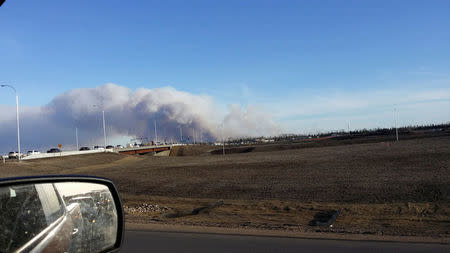Wildfire in Canada's Fort Mac energy heartland forces evacuation
By Nia Williams CALGARY, Alberta (Reuters) - An uncontrolled wildfire burning near Fort McMurray in northern Alberta, the heart of Canada's oil sands region, has forced the evacuation of nearly all the city's 80,000 residents, local authorities said on Tuesday. A number of flights from Fort McMurray airport were canceled and the airport advised passengers to check with their airlines for updates. "This is the biggest evacuation we have seen in the history of the province in terms of fire," said Alberta Premier Rachel Notley. However, the 2,650-hectare (6,540-acre) fire, which was discovered on May 1, is not close to any oil sands facilities, according to Alberta government online maps. The blaze, which started southwest of Fort McMurray, spread rapidly on Tuesday to the outskirts of the city, forcing the evacuation of the downtown area and almost every community in the lower town on the banks of the Clearwater and Athabasca rivers. TV footage and photographs on Twitter showed flames and smoke billowing over the city and traffic heading north on the highway to safety, while CTV News reported a trailer park had been destroyed. By late afternoon, the fire had blocked off one major route out of town, closing Highway 63 south of downtown. The local government told residents to drive north towards the oil sands camps. "Be calm. Be prepared. Be ready to move politely in traffic to a safe destination," said mayor of the Wood Buffalo region Melissa Blake on Twitter. Some residents were evacuated to Noralta Lodge, an oil sands camp 21 kilometers (13 miles) north of Fort McMurray. "Tomorrow is expected to be a more intense burning day than today is," said Bruce Mayer, assistant deputy minister of Alberta's Forestry Division. Mayer said that nine air tankers, more than a dozen helicopters and more than 100 firefighters were battling the fire. This is the second major fire around the city in less than a year. Last May, wildfires in the area led to the evacuation of hundreds of workers from Canada's energy heartland, leading to a 9 percent cut in Alberta's oil sands output at the time. Earlier on Tuesday authorities said the wildfire jumped the Athabasca river and breached Highway 63, the main artery south from the isolated city, which is located around 430 km (267 miles) northeast of Alberta's capital, Edmonton. Authorities are now expecting a cold front to reach Fort McMurray by Wednesday afternoon, bringing increased winds that will make tomorrow a more difficult fire-fighting day than today. Most oil sands facilities are to the north and east of the city, with the closest being Suncor Energy's base plant roughly 30 km (17 miles) away. A Suncor spokesman said there were no current impact on operations. Will Gibson, a spokesman for the Syncrude project, which has its facility around 40 km (25 miles) north of the city, said operations were unaffected. The evacuations last year led to shutdowns by Cenovus Energy and Canadian Natural Resources Ltd at some of their projects. (Additional reporting by Euan Rocha and Allison Martell in Toronto; Editing by Andrew Hay, Sandra Maler and Bernard Orr)



